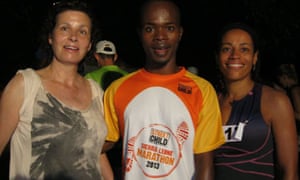The marathon race doctor was the last to speak on the eve of the big event. Dizziness, confusion, nausea and extreme headaches were among the signs runners should watch out for as indicators of possible thermal injury. “If you find yourself taking a wrong turn, turn back but just check yourself. Are you feeling muddled? This could be a sign of heatstroke.”
Travelling to Sierra Leone to do my first half marathon was always going to be a challenge – I’d never run further than 10km before. The notion of descending on a rural town, where shacks passing for homes line the streets, seems like an obscene first-world indulgence. The cost of a decent pair of trainers would feed six children for a month.
There was, however, a method in the madness. The 175 foreign runners in this tiny event (800 participated in the full, half and 5K races in total) were all here to raise money for a charity, Street Child for Sierra Leone, which established the marathon as a fundraising event last year. It seems that some people actually relish the prospect of running not just in heat, but in humidity that can push 90%.
The climate wasn’t the only challenge awaiting. The Wusum Hotel, where many runners were staying, had decided it would be a good idea to stage a beauty pageant the night before the race. Regardless of our 3.45am collection time to get to the start line, the PA system competed with chanting, whistling and screaming – still going strong at our very early breakfast.

Despite the sleep deprivation, the atmosphere ahead of the race was electric, even as we were marshalled into a runner’s pen in the pitch dark. A sense of camaraderie had already been established through site visits to the charity’s projects, and with dawn breaking it was game on. At 6.30am we were off. Conditions were relatively good: temperatures in Sierra Leone can get up to 30C by 9am, but it was the start of the rainy season and the cloud cover depressed the mercury. Being a half-marathon virgin, the pace was fastish for my level, but my strategy was to take it slowly with the aim of merely completing.
Physically, the race was such a struggle I don’t think I can even count it as my first half marathon. But it was unbeatable for its novelty – one minute I was running through the town of Makeni, passing the girls in the beauty pageant trudging home at 7am; the next I was on vibrant red dirt tracks coursing through villages and undulating forestland, where rusty tin corrugated roofs peeked out between the trees. And all to the soundtrack of “Oporto, Oporto” (white person) from the excited little children and the occasional “Thank you, thank you” (for raising money for the charity). Despite the living conditions, there is palpable optimism and it feels as if the country is on the move again after 10 years of civil war.
But it was tough: within half an hour I was struggling. The humidity was absolutely stifling. I stopped, walked for a bit, sucked a Lucozade tablet, wondered if I could complete the course at all and then carried on. It got better, then worse, then better again. By mile 10, I was really struggling. Water had been in short supply but my socks were soaked from the relentless perspiration. I completed the course in 2hr50min, exhausted and slightly frustrated.
Even the experienced runners suffered. David Hellard, the international winner of the marathon, said: “The humidity was really tough. Even after two miles, it was strange. It was difficult to know your pace. I wanted to walk at about five. You just couldn’t cool down.” He crossed the finish line in 3hr15min, just under half an hour after the winner, Freetownian Chris Johnson, who finished in 2hr49min. Darryn Bushbye, another international runner, who finished in 3hr23min, said: “That was the hardest thing I’ve done. Soul-destroying at times. You underestimate the heat. I went off too fast, and the worst thing was there was no water for the first five miles.”
Of course, running for charity – even in tough conditions – is hardly new, but with this race you get to see how your money is being spent. Street Child’s work has had some huge successes – such as Obai Koroma, who was a prostitute at 13 but now, through the charity, is a driver in one of the mines. It was an amazing way to see a country, and an amazing challenge for committed runners – and novices like me.
• Find out more at sierraleonemarathon.com and donate at justgiving.com/lisaocarroll.
Source: Read Full Article
